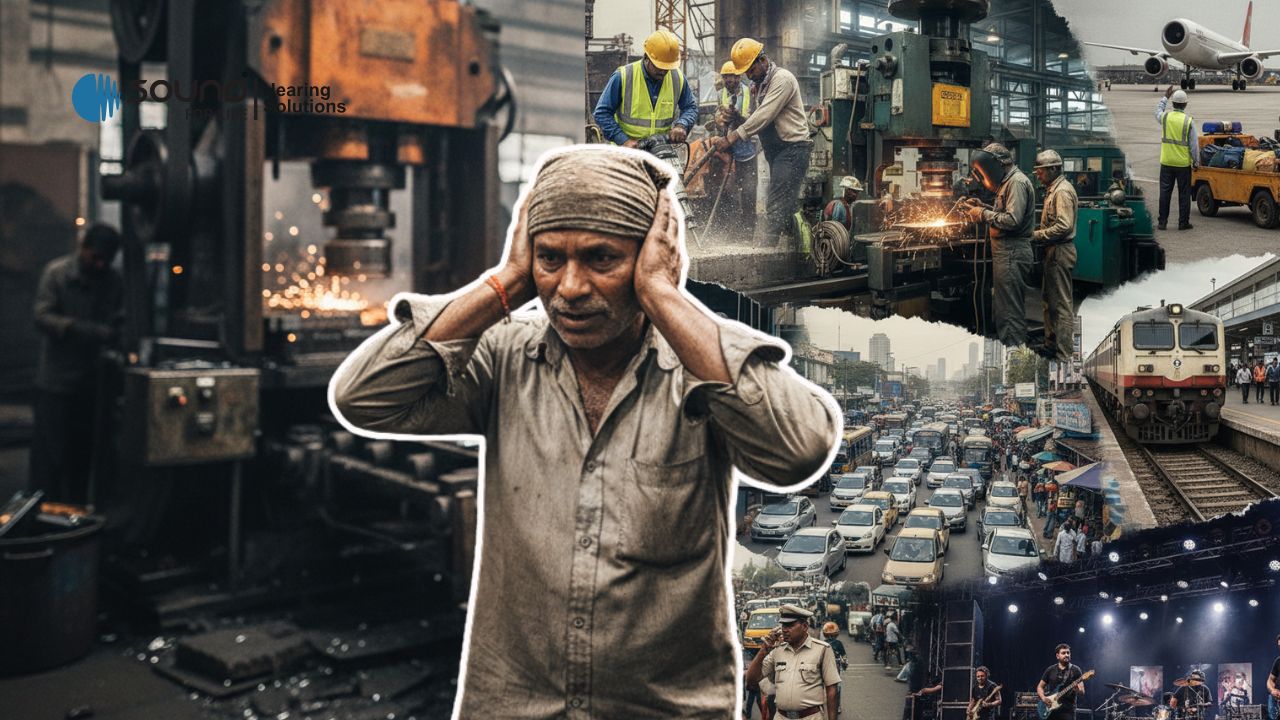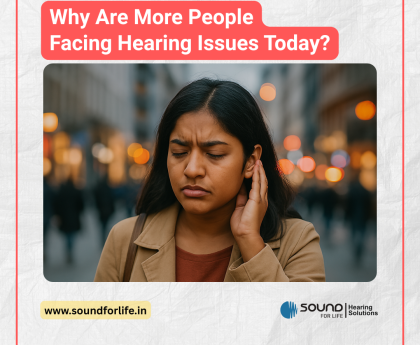One of the most important senses we use on a daily basis for both protection and communication is hearing. However, a lot of individuals don’t realize how dangerous office noise may be. Occupational noise exposure is becoming a major concern in India due to the country’s fast expanding businesses, construction projects, and crowded metropolitan areas. You can preserve your hearing for many years to come by being aware of the risks and taking preventative measures.
In this article, we will explore what workplace noise is, how it can affect your hearing, who is most at risk, and practical ways to safeguard your ears.
What Is Occupational Noise?
Loud noises at work that might hurt your hearing are called occupational noise. We use decibels (dB) to measure sound. If you hear sounds that are louder than 85 dB for a long time, they might be bad for you. The louder the sound, the quicker it may hurt.
Some loud workplaces in India are:
- Drilling, hammering, jackhammers, and huge machineries may all make a lot of noise on construction sites.
- Factories and production units: equipment like press machines, welding equipment, and generators typically create noise that lasts a long time.
- Airports, rail terminals and bustling ports are all examples of transportation hubs. They all feature noisy engines, horns and sirens.
- Traffic and roads: Constant honking and motor noise can bother traffic cops, drivers, and street sellers.
- Musicians and stage staff at loud concerts are exposed to high sound levels.
- Offices and stores: Even open offices with a lot of machinery, air conditioners, and people chatting can be stressful and impair your hearing over time.
How Noise Affects Your Hearing
The cochlea is a little organ within your ear. There are tiny hair cells in it that assist your brain perceive sound. These hair cells can be damaged by loud noises. They do not regenerate, leading to permanent hearing loss.
Noise can induce many kinds of hearing problems:
- Hearing Loss Caused by Noise (NIHL): This happens over time. You might not be able to hear high-pitched noises at first.
- Hearing loss that happens suddenly is uncommon, however it can happen after a particularly loud blast or explosion.
- Tinnitus is a sound in the ears that doesn’t go away, like ringing, buzzing, or hissing. It frequently happens after being around loud noises for a long time.
Some symptoms that you could be losing your hearing are:
- It’s hard to follow conversations, especially when there is a lot of noise.
- After work, you could hear ringing or buzzing in your ears.
- Having to turn up the TV or phone louder than before.
- A lot of the time, asking them to repeat themselves.
- A sensation of fullness or pressure in the ears.
Who is most likely at the Risk of losing Hearing in India?
People who spend a lot of time in noisy locations are at danger.
But certain jobs are more dangerous:
- Workers in construction and labour
- People who work in factories and on assembly lines
- Drivers and cops on the road
- Ground crew and mechanics at the airport
- Musicians, sound engineers, and anyone who work on stage
- Farmers employing noisy machines
- People who operate in tiny shops, such metal shops and grinders
Even office workers aren’t immune. Modern urban offices often have background noise from printers, HVAC systems, and chatter that may cause subtle, cumulative hearing damage over the years.
Noise Exposure Limits in India
According to the Central Pollution Control Board (CPCB) and the Factories Act, 1948, people should not be exposed to noise levels more than 90 dB for more than 8 hours at a time. If the noise level is more than 90 dB, businesses should cut down on the time workers spend there and give them the right hearing protection. Employers must follow safety rules and make sure their staff have the right tools and training.
Many workplaces don’t follow these guidelines strictly, even if they are in existence. That makes it very important to take care of yourself and be aware of your surroundings.
Simple and useful techniques to keep your hearing safe
It’s easy to protect your ears, yet it can make a tremendous impact. You or your boss can do these things:
1. Wear hearing protection
- Earplugs: Simple and cheap to use. They can lower noise levels by 15 to 30 dB.
- Earmuffs cover the full ear and typically offer better protection.
- Custom-made protectors: These are built just for your ears and are optimal for long-term usage.
- Electronic earplugs let you hear conversation but block out loud, damaging sounds. They are handy in busy places.
2. Limit the time you spend exposed
- Get away from the noisy equipment for a few minutes.
- Rotate personnel so that no one stays in the loudest location for too long.
3. Stay away and utilise obstacles
- If you can, stay away from the loud source.
- To suppress sound, use walls, curtains, or enclosures.
4. Follow the guidelines for safety at work.
- Put on protection when you need to.
- Read and pay attention to signals that say “noise.”
- If your job provides hearing safety training courses, sign up for them.
5. Get your hearing checked often
- Use audiometric exams to look for early indicators of hearing loss.
- Finding out about an issue early lets you do something about it before it becomes worse.
Signs You Should Get a Hearing Check
Even if your job seems “low-risk,” subtle changes in hearing may go unnoticed. Schedule a hearing evaluation if you experience:
- Ringing after concerts or work.
- Having trouble following talks in groups.
- Turning up the volume on the phone or TV.
- People say that you talk too loudly.
People who work in loud occupations should have regular checkups, even if they feel OK. Early intervention can prevent permanent damage and improve your quality of life.
Long-Term Consequences of Ignoring Workplace Noise
Ignoring occupational noise can lead to more than just hearing loss. Studies indicate that prolonged exposure to loud environments may also cause:
- Stress and fatigue
- Sleep disturbances
- Reduced productivity
- Increased risk of cardiovascular problems
Protecting your hearing also helps your overall health.
Employer and legal responsibilities in India
It is the responsibility of employers to make sure that their workplaces are safe.
Key responsibilities include:
- Conduct regular noise assessments
- Provide appropriate hearing protection
- Implement training and awareness programs for employees
- Monitor long-term hearing health of workers
If your employer does not follow the rules, you can raise concerns with your supervisor or local labour authorities.
A Role healthy lifestyle with good nutrition for better hearing
Hearing loss is irreversible once it is damaged, but being healthy can help your ears perform better. These tips could help:
- Eat meals that are high in minerals like magnesium and vitamins A, C, and E.
- Don’t smoke a lot or drink too much alcohol; they might affect the blood flow to your ear.
- Keep your blood sugar and blood pressure in check.
- Get enough sleep and manage stress.
A nutritious diet and healthy lifestyle are good for your hearing and your health in general.
Emerging Technology in Hearing Protection
Modern technology has made hearing easier for workers. Rapidly advancing technology is making hearing protection smarter and easier to use without compromising communication:
- Smart earmuffs and electronic earplugs block out or reduce harmful sounds while letting you hear conversation clearly.
- Noise-cancelling earmuffs are useful in very loud places.
- Smart wearables can track how much noise you are exposed to and warn you when levels are unsafe.
Choosing the right device can keep you safe and let you work comfortably.
Take action today to protect your hearing
Your hearing is invaluable. Noise at work in India is a growing problem, but you can protect yourself and prevent irreversible damage. If you’re unsure about your risk or want to protect your ears effectively, consider:
- Scheduling a professional hearing test
- Every time you need it, use hearing protection.
- Talk to your boss about safety initiatives and noise inspections.
- If you work in a noisy place, get your hearing checked often.
- Educating your team or family about occupational noise risks
We at SFL Hearing Solutions offer hearing examinations, guidance, and protection alternatives that are just right for you. If you think you might have hearing issues, make an appointment for a test and obtain a plan just for you.
Disclaimer: This article is intended for educational purposes only and does not substitute professional medical advice. Always consult a qualified audiologist or healthcare professional for personalized recommendations regarding hearing protection, diagnosis, and treatment.





